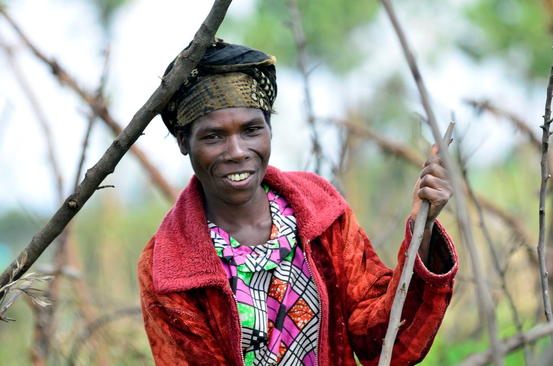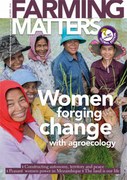The role of rural women and smallholder farmers in African society has been highly undervalued. This is so despite the fact that around 80% of Africa’s population is dependent on smallholder agriculture, it is the backbone of the rural economy, and women provide over two-thirds of the farm labour. There is clear evidence that agroecology is crucial for women farmers. Now we face the challenge of discovering how its principles can best be promoted and how practice can inform policy at local and national level.

Recently, we have seen unequivocal changes in policies that are transforming African agriculture to facilitate a ‘Green Revolution’. These policies articulate and promote a form of agriculture that focuses on monocropping, expensive external inputs such as agrochemicals and synthetic fertilizers, hybrid/GM seeds and large-scale land acquisition. These changes in policies are a result of government alliance with institutions such as the Alliance for Green Revolution in Africa (AGRA), multilateral institutions, donors and multinational corporations that aim to produce a layer of commercial surplus producers. This was reaffirmed in a report published by African Centre for Biodiversity in 2014. For example, soil and seed programmes under AGRA tend to favour the introduction of synthetic fertilizers while supporting and preparing institutional and technical grounds for Public-Private Partnerships in the seed sector.
The G8 New Alliance for Food Security and Nutrition (NAFSN) in Africa was launched in 2012, where 10 African countries made numerous policy commitments in order to ensure agricultural transformation within their countries and ultimately to ‘lift 50 million people out of poverty in 10 years’. The initiative is largely dominated by multinationals. It requires states to revise their seed, land and tax policies and legislation in order to secure investment.
Such policy changes are evidenced through the adoption of Intellectual Property see laws by African countries at the national and regional level. These seed laws give strong rights to commercial breeders while restricting farmers’ rights to save, use, exchange and sell protected varieties/seeds and propagating materials. They favour the use and adoption of improved varieties that are uniformly bred and that must be used with agrochemicals in order to attain high yields.
At the same time, there is a speedy acquisition of large tracts of land by governments to be allocated to private investors for commercial viable crops in agricultural corridors through agricultural development plans. This acquisition displaces small holder farmers, in particular women, who depend on this land, and forces others to grow commercial crops while abandoning food crops, a huge threat to food security. These initiatives and programmes contrast sharply with the priorities of the majority of smallholder farmers who practice ecological and sustainable farming techniques such as agroecology that are inexpensive, simple and effective.
Women as custodians
In many rural areas, women tend to manage complex production systems with multiple functions, purposes, and species. They produce, handle and prepare food, while being responsible for the nutrition of their families. They provide most of the labour for farming, from soil preparation to harvesting. Further to that, after harvesting, they are almost entirely responsible for operations such as storage, handling, stocking, marketing and processing.
Farming based on diversity is not designed to maximize productivity but to ensure overall stability
And they know how to take care of the needs of the household. For example, women who wanted to improve their situation are now growing various kinds of African leafy vegetables alongside their other crops, some of which are cash crops. These vegetables are an important component of the diet for rural and urban dwellers. They are affordable and also rich in micro-nutrients. They maintain genetic diversity while improving nutrition and livelihoods.
In Kenya alone, there are over 200 species of African leafy vegetables and these are mostly produced by women.
Such production systems based on diversity are not designed to maximize the productivity of any single crop but to ensure overall stability and resilience of the farming system as a whole. The chosen crops are often of minor commercial significance, but of great importance for household nutrition and food security. This essential work carried out by women is often invisible and neglected by support agencies due to its lack of commercial value. The current mainstream agriculture trajectory does not value such initiatives of women based on principles of agroecology. Instead, it is reducing the role of smallholder farmers and women in particular, and is leaving them out of the decision-making process regarding policy and development.
Women are the custodians of seed saving, ensuring food security and genetic diversity. Unfortunately, the new seed and plant variety protection policies and laws marginalise women and criminalise their age old practices of unfettered seed exchange. Likewise, the threat of the introduction of genetically modified seed is now real within our region, and in my own country, Tanzania. Current regulations to ensure the safety of the smallholder farmers’ environment and the food they produce for their families and markets are being changed without their involvement. Limited farmer awareness about the adverse impacts of these technologies also compromises farmers’ abilities to defend their positions.
Shifting policy
With the large presence of smallholder farmers in agricultural production, policy dynamics at every level need to shift so that smallholder farmers – especially women – participate in decision-making and can ensure their priorities are reflected in appropriate agricultural policies. These agricultural policies need to ensure that the power of choice and innovation remains in the hands of smallholder farmers, their organisations and communities that produce food. This is equally true for pastoralists, fishers, and forest dwellers who contribute to the food system in sustainable and significant ways.
Policies at all levels need to focus on:
- Ensuring that farmers, especially women, remain at the centre of localised seed production systems and that farmers define needed improvements to seeds;
- Supporting farmer-led extension networks that provide training for farmers on agroecological techniques, while linking them to research and resources;
- Recognising and expanding farmer-managed seed diversity, local germplasm and organisational and technical capacity;
- Allocating land to smallholder farmers and ensuring access for women and youth;
Removing ownership on seed that is supplied to farmers by public institutions and programmes.
This leaves no doubt that despite the lack of clear policy commitment to support women and agroecology, there is a renewed and growing momentum of social movements that continue to advocate, practice and diversify farming systems through agroecology. These movements are bound to influence decision making and adoption of agroecological principles at the international and national spheres. Once the principles of agroecology are firmly embedded in African policy making, women can regain their rightful position at the centre of agricultural transformation.
Sabrina Nafisa Masinjila
Sabrina Nafisa Masinjila is the Outreach and Advocacy Officer for the African Centre for Biodiversity http://acbio.org.za. She focuses on biosafety, farmers’ rights, seed and food sovereignty in East Africa.
The statements in this article were first presented at the Africa Grantmakers’ Network Assembly in July 2015 in Tanzania, at a session sponsored by the New Field Foundation.

